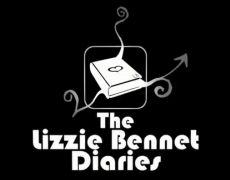
YouTube has a lot to answer for. It’s creation in 2005 has led to copious amounts of cat videos, easy access to pirated and remixed music, and, for a significant number of people, fame. The extent of its spread means that I’m unable to discuss every single ripple its splash has created, so I’ve chosen to zone in on a specific area which I find fascinating: Modern adaptations of classic literature. As a future English and Film major, it’s most likely easy to understand the reasons behind my interest in this topic, a combination of new and old, with constant, subtle references to the original text thrown in for good measure. This not only entices individuals who aren’t typically inclined to classic literature to enjoy stories which are renowned for a reason, but the new dimension also allows aficionados of the tales told to experience their favourite texts once more, in alternative light.
Whilst modern adaptations of classic literature have certainly been around for some time in the entertainment industry, the increase in content of this variety is recent. The arguable trigger for this spike is The Lizzie Bennet Diaries (April, 2012). A parody of Austen’s ‘Pride and Prejudice’, presented in the form of a vlog (that’s video blog, anyone over 30), in which Lizzie, as many youtubers do, holds a direct relationship with each member of her audience. This is actually very in keeping with the original novel, which is written in free indirect style, giving each reader an insight into the thoughts of the protagonist, correspondingly allowing a personal relationship with Elizabeth to blossom. The web series, created by Hank Green and Bernie Su, was a roaring success, encouraging them to produce a further Austen adaptation – Emma. Again, the series was undoubtedly true to the original text, despite the modern setting, Joanna Sotomura’s Emma is as precocious as Austen intended. Unfortunately, it was not as successful as the creators had hoped, getting less press and recognition than LBD (which, incidentally, won an Emmy). This may be due to the difference in character between each protagonist – Lizzie Bennet is certainly more likeable than Emma Woodhouse. Nevertheless, it inspired further adaptations, such as Frankenstein MD, Classic Alice, and, the next point of focus, Nothing Much To Do.

Stepping back a little further than the previously mentioned subjects of adaptation, Nothing Much to Do is the retelling of the classic Shakespeare play, ‘Much Ado About Nothing’. Set at Messina High in Wellington, the story begins with Beatrice Duke introducing herself to the Internet, and is told through the YouTube channels of her, and two others (Benedick Hobbes, and Ursula). I thought that this spectacularly hilarious project was important to mention, as the creators are around my age. Examples of Young people being creative is, I think, especially important, and such fantastic content should hopefully inspire others to produce things of a similar standard. The translation from the Elizabethan era to present-day is done with great style - Claudio and Hero uploading a ‘My boyfriend does my make-up’ video, the local bumbling watch, Dogsberry and Verges becoming year-nine detectives, obsessed with BBC’s Sherlock, and the King of Messina, Don Pedro, now the star of the football team and class president. It is important to recognise that when Shakespeare was written, it was relevant, and modern. This adaptation may well help students understand the playwright’s true intentions, more than any English class ever could.
To all those who argue that these frankly spectacular re-imaginings demean the original text, and are too lowbrow to be considered to have any worth - have you properly read the books? They were never originally classics. Shakespeare, for example, wrote a ‘your mum’ joke into his apparently highbrow works (‘Thou hast undone our mother/Villain, I hast done thy mother). So, to those who dismiss modern works in favour of older texts because of their status as ‘classics’, you’re completely missing the point. When published, those books weren’t classics. In truth, some received a copious amount of criticism (for example, Wilde’s ‘The Picture of Dorian Gray’). So, these modern adaptations have not only introduced a large number of people to stories that have lasted through the ages, but in truth, they make them more relatable. A modern audience are not confused as to why Elizabeth Bennet turns down a marriage proposal from Mr. Collins, as Austen would have intended. Elizabeth barely knew the man, yet the financial needs of her family, and her duty as a woman in the Georgian Era, made her rejection uncommon. Lizzie refusing a job offer from Ricky Collins however, does slightly befuddle the modern audience, given her situation. I hope I’ve been able to explain the reasons for my delight in this current trend, which hopefully, and in keeping with the texts they recreate, won’t lose popularity any time soon.
LBD logo: https://s-media-cache-ak0.pinimg.com/originals/b2/3a/56/b23a56adc1b08cbab12385e5761ffe91.jpg
NMTD image: http://www.hypable.com/nothing-much-to-do-web-series/

0 Comment:
Be the first one to comment on this article.